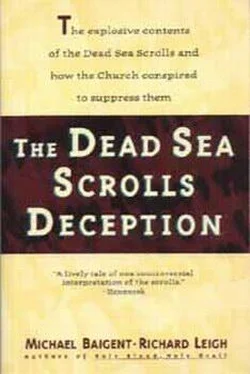The Acts of the Apostles fleshes out the picture only slightly. From the Acts, one derives at least a tenuous sense of a milieu — of internecine strife and doctrinal squabbles amongst Jesus’ immediate followers, of a coalescing movement which will gradually take the form of ‘Christianity’, of a world that extends beyond the circumscribed confines of Galilee and Judaea, of the geographical relation of Palestine to the rest of the Mediterranean. But there is still no accurate rendering of the broader social, cultural, religious and political forces at work. Everything is focused on, and restricted to, St Paul. If the Gospels are stylised, the Acts are no less so, albeit in a different way. If the Gospels are reduced to the stark oversimplification of myth, the Acts comprise a kind of picaresque novel — a picaresque novel, moreover, intended for specifically propagandist purposes and with Paul as protagonist. There may be some insight into Paul’s mentality, attitudes and adventures, but there is no reliable perspective on the world in which he moved. From the standpoint of any historian, any responsible chronicler, no account of the epoch would have been complete without some reference to Nero, say, and the burning of Rome. Even within Palestine, there were developments of momentous importance to those living at the time. In ad 39, for example, Herod Antipas, Tetrarch of Galilee, was exiled to the Pyrenees. By ad 41, both Galilee and Judaea — administered by Roman procurators since ad 6 — had been conferred on King Agrippa, and Palestine was united under a single non-Roman monarch (puppet though he might be) for the first time since the days of Herod the Great nearly half a century before. None of these developments is so much as mentioned in the Acts of the Apostles. The effect is akin to reading a biography of, say, Billy Graham which makes no mention of his friendships with presidents and other prominent individuals, no mention of Kennedy’s assassination, no mention of the civil rights movement, the war in Vietnam, the transformation of values during the 1960s, Watergate and its aftermath.
Contrary to Christian tradition, Palestine two thousand years ago was as real as any other historical setting — that of Cleopatra’s Egypt, for example, or of Imperial Rome, both of which impinged upon it. Its reality cannot be reduced to a bald mythic simplicity. Whoever Jesus or Paul were, and whatever they did, must be placed against the backdrop of broader events — against the swirl of personalities, groups, institutions and movements that operated in 1st-century Palestine and composed the fabric of what is called history.
To obtain any real sense of this period, we, like every other researcher, had to turn to other sources — Roman accounts, historical chronicles compiled by other writers of other orientations, allusions in later documents, apocryphal texts, the teachings and testimony of rival sects and creeds. Jesus himself was, needless to say, seldom mentioned in these sources, but they furnish a comprehensive and detailed picture of the world in which he moved. In fact, Jesus’ world is better documented and chronicled than, for example, that of King Arthur, or of Robin Hood. And if Jesus himself remains elusive, he is no more so than they.
It was therefore with surprise and zest that we plunged into the background of the ‘historical Jesus’. But no sooner had we done so than we found ourselves confronted by a problem that besets all researchers into biblical history. We found ourselves confronted by an apparently bewildering spectrum of Judaic cults, sects and sub-sects, of political and religious organisations and institutions, which seemed sometimes to be militantly at odds with one another, sometimes to overlap.
It quickly became apparent to us that the labels used to differentiate between these various groups — Pharisees, Sadducees, Essenes, Zealots, Nazorenes — were neither accurate nor useful. The muddle remained, and Jesus seemed to have connections of one kind or another with virtually all its components. Thus, for example, insofar as anything could be established about him at all, he appeared to have come from a Pharisee family and background, and to be steeped in Pharisaic thought. Several modern commentators have stressed the striking parallels between Jesus’ teachings, especially the Sermon on the Mount, and those of Pharisee exponents such as the great Hillel. According to at least one commentator, Jesus ‘was himself a Pharisee’.
But if Jesus’ words were often interchangeable with those of official Pharisee doctrine at the time, they also appear to draw heavily on mystical or ‘Essene’ thought. John the Baptist is generally recognised as having been an Essene of some sort, and his influence on Jesus introduces an obvious Essene element into the latter’s career. According to scriptural accounts, however, John’s mother — Jesus’ maternal aunt, Elizabeth — was married to a priest of the Temple, thereby giving both men Sadducee connections. And — most sensitive of all for later Christian tradition — Jesus clearly seems to have included Zealots among his followers: Simon Zealotes, for example, or Simon the Zealot, and possibly even Judas Iscariot, whose name, as it comes down to us, may derive from the fierce Sicarii.
In itself, of course, the mere suggestion of association with the Zealots was highly provocative. Was Jesus indeed the meek lamblike saviour of subsequent Christian tradition? Was he indeed wholly non-violent? Why, then, did he embark on violent actions, such as overturning the tables of the money-changers in the Temple? Why is he portrayed as being executed by the Romans in a fashion reserved exclusively for revolutionary activity? Why, before his vigil in Gethsemane, did he instruct his followers to equip themselves with swords? Why, shortly thereafter, did Peter actually draw a sword and lop off the ear of a minion in the High Priest’s entourage? And if Jesus was in fact more militant than generally depicted, was he not also, of necessity, more politically committed? How, then, could one explain his preparedness to ‘give unto Caesar’ what was Caesar’s — assuming that to be an accurate transcription and translation of his words?
If such contradictions surrounded Jesus during his lifetime, they also appeared to have survived him, continuing for at least another forty-odd years after his reported death. In ad 74, the fortress of Masada, having withstood a sustained Roman siege, was at last overrun, but only when its defending garrison committed mass suicide. The defenders of Masada are generally acknowledged to have been Zealots — not a religious sect, according to conventional interpretations, but adherents of a political and military movement. As it has been preserved for posterity, however, the doctrine of the garrison’s defenders would appear to have been that of the Essenes — the allegedly non-violent, mystically oriented sect who were believed to have disowned all forms of political, not to say military, activity.
Such were the contradictions and prevailing confusion we found. But if we were flummoxed by it all, so, too, were professional scholars, ‘experts’ far more deeply versed in the material than ourselves. After threading a path through the maze, virtually every reliable commentator ended up at odds with his colleagues. According to some, Christianity arose as a quietist, mystery-school form of Judaism, which couldn’t therefore have any connection with militant revolutionary nationalists such as the Zealots. According to others, Christianity was itself, at first, a form of revolutionary fudaic nationalism, and couldn’t possibly have anything to do with pacifist mystics like the Essenes. According to some, Christianity emerged from one of the mainstreams of Judaic thought at the time. According to others, Christianity had begun to deviate from Judaism :ven before Paul appeared on the scene and made the rupture official.
Читать дальше












